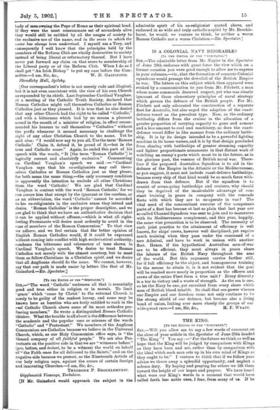IS A COLONIAL NAVY DESIRABLE?
[TO THE EDITOR OF THR "SPECTATOR.']
Sin,—Tbe admirable letter from Mr. Napier in the Spectator of June 28th endorses with great force the view which on a former occasion you were good enough to allow me to express in your columns,—viz., that the formation of separate Colonial squadrons would presage the downfall of the British Empire in war. The letters on this subject which then appeared were evoked by a communication to you from Mr. Fitchett, a man whose name commands deserved respect, yet who was clearly ignorant of those elementary principles of naval strategy which govern the defence of the British people. For Mr. Fitchett not only advocated the construction of a separate fleet for Australia, but also urged the adoption of the coast- defence vessel as the prevalent type. Now, as the ordinary battleship differs from the cruiser in the allocation of a greater proportion of carrying capacity to guns and armour and a less amount to coal and machinery, so does the coast. defence vessel differ in like manner from the ordinary battle- ship. It is by its design intended to be a powerful fighting machine in its home waters, and it is by that design precluded from sharing with battleships of greater steaming capacity and lighter proportionate armaments in that distant work of watching an enemy's ports which must be in the future, as in the glorious past, the essence of British naval war. There- fore if the proposed Australian Squadron is to aid in the defence of the Empire in the Atlantic or the Mediterranean, as you suggest, it must not include coast-defence battleships, because every ship of that kind would be so much force with- drawn from that defence. But if the squadron is to consist of ocean-going battleships and cruisers, why should they be deprived of the incalculable advantage of con- stant training in peace in company with the comrade fleets with which they are to co-operate in war? The vital need of the concomitant exercise of the component parts of a fleet has become at last so plain that last year our so-called Channel Squadron was sent to join and to manceuvre with its Mediterranean complement, and this year, happily, the same wise precaution is to be observed. The necessity of such joint practice to the attainment of efficiency is well known, for ships' crews, however well disciplined, yet require much training when they pass under the command of a new Admiral, and have to work in unison with another fleet. Hence, if the hypothetical Australian men-of-war are to be efficient, they must always in peace share the labours of the British Navy throughout the seas of the world. But this argument carries farther still, for if full efficiency be the object, and homogeneous training be the means to attain it, is it not evident that the goal will be reached more nearly in proportion RH the officers and crews of the entire Fleet form a true unit ? Every diversity is a bar to victory and a waste of strength. As the sea is one, so let the Navy be one, yet recruited from every shore which men of British blood inhabit. So shall that sea-power whence our Empire and our freedom came not only continue to be the strong shield of our defence, but become also a living bond of union, linking ever more closely the groups of our
widespread race.—I am, Sir, Ice., H. F. WYerr.














































 Previous page
Previous page